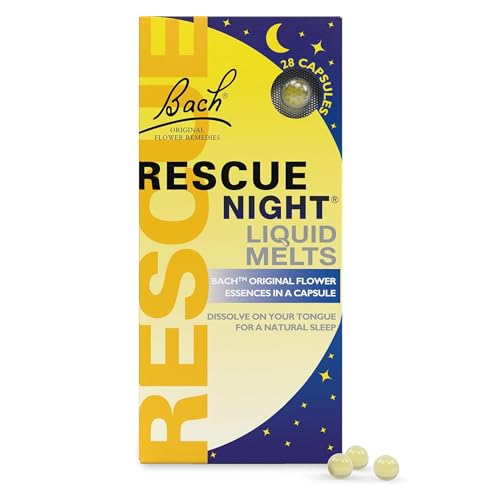If you have a chronic illness, you probably experience difficulty sleeping. Whether the problem stems from trouble falling asleep because of symptoms such as pain, or anxiety relating to managing your condition, sleep is essential to healing and recuperation. With so many products on the market aimed at helping insomniacs get a decent night’s sleep, it can be hard to know where to start. Here are a few well-regarded tips for banishing insomnia when you live with a chronic illness.
This post contains affiliate links, so if you make a purchase, we may receive a small commission at no additional cost to you. As an Amazon associate, we earn from qualifying purchases.
1. Rescue Remedy for Sleep
A long-term popular option for anyone feeling anxious, tense, or stressed, Rescue Remedy is a natural product that combines a unique blend of Bach flower essences to encourage relaxation. With a range of sprays, capsules, drops, pastilles, and creams, including some specifically designed to aid sleep, these affordable products are well worth trying. A relaxed body is more likely to drift off to sleep and stay asleep long enough to reach deep sleep, which helps restore muscles, and REM sleep, which affects mood.
2. Lavender for Sleep with a Chronic Illness
Inhaling lavender oil before bed can improve the quality of your sleep. As aromatherapy continues to grow as a mainstream alternative therapy, it’s easy to buy from health shops, chemists, and online. Dab neat oil on a tissue or spray your pillow with a diluted spritz. You can also opt for the old-school option of a lavender bag, or if you are a keen gardener, why not place sprigs of fresh lavender in a vase on your bedside table? Not only will it help you relax, but it’ll also prettify your space.
3. Sleep Apps
Sometimes it feels like your brain is in overdrive and when you’re lying in bed worrying about appointments, medication, or how you’ll manage to get through your to-do list at work when you’re feeling under par, being lulled to sleep can help. An overactive brain at bedtime can be soothed using specialist relaxation apps such as Calm which offer meditations, bedtime stories, and other aids to help you switch off at the end of the day. Fitbit Premium has similar options available.
4. Pillows and Cushions to Reduce Chronic Pain and Insomnia
When your body is in pain, it can be difficult to get comfortable. If you are aching, using cushions and pillows to support your body can help as it relieves pressure. Long pillows designed for use in pregnancy can help, especially if you sleep on your side. Propping up your body with pillows takes the strain off sore joints and pressure points and makes it easier to find a position to rest. With a variety of fabric choices such as cuddly teddy bear pillows and smooth, silky options, these tactile items can also be comforting to cuddle when you’re unwell.
Looking for more ideas? Check out our article about comfortable bedding to reduce painsomnia.
5. Heating Pads, Hot Water Bottles, and Heating Patches to Help You Fall Asleep Despite Chronic Pain
If your pain is localized, you may find it helps to apply warmth to the affected area. A hot water bottle can help relieve pain as well as being easy to move if you have multiple parts of your body which are causing discomfort. For specific pain, it can be helpful to apply a heat patch that sticks to the skin. This ensures the warmth targets the area causing pain. Some people find that the soothing effect of the heat can ease the aches enough to get a better night’s sleep.
Looking for cuddly heated buddies to combat chronic pain? Check out our article on Warmies and microwavable stuffed animals.
With chronic illnesses affecting everyone differently, it can take trial and error to find what works for you. If you are regularly having difficulty falling or staying asleep, it is worth talking to a healthcare professional such as a pharmacist or GP. If you feel your pain isn’t being managed, speak to your doctor or consultant about available medication. Sleep is important for everyone, but especially those with a chronic illness. Don’t suffer alone!
What helps you sleep despite chronic illness symptoms such as pain and fatigue?
Share your ideas with our spoonie community in the comments!
Photo by cottonbro studio on Pexels


















